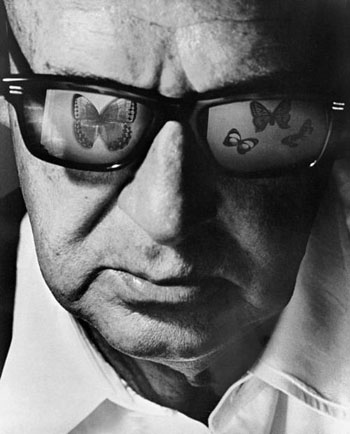A few weeks ago, we opened an entry with Girish Shambu‘s outline of Adrian Martin‘s “wonderfully ambitious and erudite” new book, Mise en Scène and Film Style: From Classical Hollywood to New Media Art. Now comes another recommendation from none other than Jonathan Rosenbaum: “At once dense and highly accessible, this 235-page book is an impassioned battle cry for the future of film art grounded in an expanded and sharpened view of its critical history.”
“Nabokov was trading in movie-friendly, noirish suspense long before Lolita,” writes John Colapinto for the New Yorker. “His 1938 novel, Laughter in the Dark, (about which I wrote in an earlier post) is a lurid love triangle involving an amateur film producer, a would-be film animator, and an underage aspiring actress…. Nabokov seemed also to have had the movies in mind when he dreamed up King, Queen, Knave, his second novel, first published, in Russian, in 1928. Like Laughter in the Dark, it tells the story of a racy love triangle, this time with a tinge of incest.” The 1972 adaptation was directed by Jerzy Skolimowski; Colapinto also discusses Fassbinder’s 1978 adaptation of Despair (1936). “But the adaptation I’m still waiting for is Pale Fire, which pretty much everyone agrees is unfilmable. The idea of a movie version was first suggested to me back in 1985, when I was interviewing David Cronenberg, who discussed his fantasy of adapting the book.”
“Going to Hollywood was as much about his own personality, and his professional life, as about paying the bills,” writes Anne Margaret Daniel in the TLS, presenting a few of F. Scott Fitzgerald’s unpublished letters written in 1937 and 1938.
“If ever a performer needed reappraisal, it’s Bob Hope,” argues Vince Keenan. “His star has faded badly, the bulk of his work done on radio and television and thus not now in regular circulation. Worse, he committed the unpardonable sin of staying too long at the party.” But Richard Zoglin’s “massive, richly entertaining biography underscores what I’ve learned in recent years—Bob Hope, at his best, was brilliantly funny. Zoglin also persuasively argues that Hope was a trailblazer fully deserving of the book’s subtitle, Entertainer of the Century. By triumphing in every medium and cannily tending a brand built largely on his role as clown jester for American troops overseas, Hope essentially invented modern stardom.”
At the AV Club, David Brusie reviews Patton Oswalt’s “memoir about moviegoing in the ’90s,” Silver Screen Fiend: Learning About Life from an Addiction to Film. “Though Oswalt’s film knowledge is near-encyclopedic, his book is a humble, self-effacing account of a man who, by his own admission, spends too much time in the dark. ‘Movies,’ he writes, ‘are an enhancement to life. The way a glass of wine complements a dinner. I’m the other way around.’ Oswalt’s struggle to reverse that dichotomy makes for a funny, emotionally rewarding coming-of-age story.”
Event. On Wednesday (January 7) at Strand Books in New York, Farren Smith Nehme will be presenting her debut novel, Missing Reels, and has “invited a panel of film experts, including Vanity Fair’s James Wolcott; critic and author of the fan favorite Wes Anderson Collection, Matt Zoller Seitz; and Anne Helen Petersen, author of the recent release Scandals of Classic Hollywood.”
Updates: Not long after this post went up, two more reviews of Patton Oswalt’s book appeared. “In an age when writing a memoir has become a mere box to be checked on an entertainer’s to-do list, Silver Screen Fiend has the advantage of an animating theme,” writes Elbert Ventura for Slate. “The book still doesn’t quite sidestep the drawbacks of the contemporary pop memoir, reading too often like an anecdote dump straining for profundity. But Oswalt has a good angle—a portrait of the artist as a young film buff—and the book underscores a point often lost in talking about movie love: the sheer work of being a real cinephile.”
For NPR’s Linda Holmes, who notes that Oswald recently talked about the book on All Things Considered, “the most effective material in the book is the most straightforward and confident, and the least effective feels self-conscious, as if he’s feeling the obligation to do justice to beautiful films and theaters by creating prose that has adequate adornment.”
In the current issue of Transit, Cara Tovey reviews Marco Abel’s The Counter-Cinema of the Berlin School and Jaimey Fisher’s Christian Petzold: “Both authors delve into the films of the Berlin School and examine what these films have in common and what distinguishes them from ‘mainstream’ national German cinema. Through their respective examinations, what emerges is not the importance of production or reception, but a focus on the symbolic idea of Germany and the conception of the Berlin School as a possible ‘counter-cinema.'”
Updates, 1/6: “The fact that Oswalt is a recovering cineaholic didn’t stop him,” notes Rolling Stone‘s David Fear, “from playing along with a request to map out his rise from budding fanatic to headlining comic via 10 films that moved him, marked him and hit him ‘right in that formative sweet spot.'”
And Martin Schneider talks with Oswalt for Dangerous Minds. And you can listen to Jessie Katz‘s conversation with him for the Hollywood Reporter (54’13”).
For news and tips throughout the day every day, follow @KeyframeDaily. Get Keyframe Daily in your inbox by signing in at fandor.com/daily.




